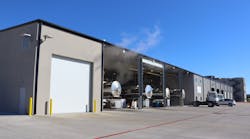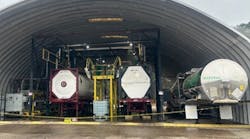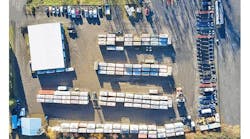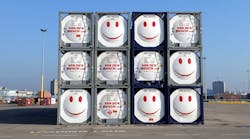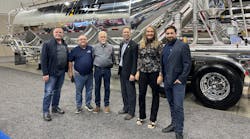Even in the face of a slowing economy, managers at National Tank Services Inc (NTS) remain optimistic. They firmly believe that the company will achieve a projected 25% growth rate this year and in coming years.
The tank wash and maintenance service provider is following an aggressive schedule to open new facilities and renovate and expand existing locations. Upgrade objectives include adding more efficient tank cleaning equipment, expanding vehicle maintenance capabilities, and creating a more customer-friendly environment.
“We have a growth plan, and we are working it,” says Travis O'Banion, director of washrack and environmental services for Trimac Transportation, the NTS parent company. “We believe that even in a down market, we can hit our growth targets.
“We're moving forward on new wash racks in 2008, and we plan to add cleaning capacity at existing tank wash facilities. We're also looking at the feasibility of adding tank cleaning at NTS locations that currently provide only vehicle maintenance service.”
North American network
NTS currently runs 27 facilities in the United States. Of those, 15 offer tank cleaning and vehicle maintenance. The others provide just vehicle and tank maintenance. The US facilities are in Alabama, California, Colorado, Georgia, Kentucky, Louisiana, Michigan, Oklahoma, Pennsylvania, South Carolina, South Dakota, Texas, and Wyoming.
NTS also works with Trimac operations in Canada. That includes sister division National Tank Cleaning Services (NTCS), which runs tank cleaning racks in Mississauga, Ontario, and Montreal, Quebec. Along with those two locations, Trimac has nine wash rack and maintenance shop facilities spread across Canada in Alberta, British Columbia, Saskatchewan, Manitoba, Ontario, Quebec, New Brunswick, and Newfoundland. Another nine Canadian locations offer just vehicle maintenance.
All of this gives NTS the ability to market what management believes is the largest tank cleaning and maintenance network across North America. “We can provide our customers with tank cleaning and vehicle maintenance services in most major markets in North America,” O'Banion says.
System wide, NTS cleans about 5,000 tank trailers a month, with the business split about 50/50 between Trimac and other cargo tank owners. “Our goal is for other customers to account for around 70% of our tank cleaning business,” O'Banion says. “We're making progress on that, and we are working hard to boost productivity throughout our system.”
Young but aggressive
NTS was launched about two-and-a-half years ago as part of a Trimac strategy to enhance commercial tank cleaning and shop capabilities. Management also made it clear from the outset that they expected NTS to stand on its own as a profit center.
“Trimac offered commercial tank cleaning at many of its fleet terminals long before we established NTS,” O'Banion says. “We wanted to expand that capacity, and it is clearly recognized within Trimac that NTS is a fully commercial operation that provides the same high level of service to all of our customers. Trimac just happens to be one of those customers.
“We strongly believe that our wash racks and maintenance facilities have been able to build a better quality of service since NTS became a free-standing division within Trimac. Our managers and employees have become more service oriented. We know we have to earn our customers' business every day.”
Customer culture
Building a customer-focused culture was the first project tackled by O'Banion and his management team when NTS was established in 2005. They developed a training program called “It's up to me.”
Every employee at every NTS branch was required to go through the program, and it has become a key component in new-hire training. Focused on behavioral training, the program shows workers how to treat customers. Cleanliness and personal attitude are stressed.
“We want our workers to understand that there are moments of truth anytime they interact with a customer,” O'Banion says. “Each worker will determine in those moments whether a customer has a positive or negative impression of NTS.”
Proper phone etiquette is part of the training. Workers are taught to follow a very strict script when answering the telephone. Further, NTS has modified the voicemail of its telephone system to ensure that a live person answers the phone as often as possible.
New hire training goes well beyond “It's up to me.” Wash rack workers receive a technical orientation that is process driven. It takes a couple of weeks for the new wash rack worker to develop the basic skills needed for the job.
“During this training, we explain why we do things the way we do at NTS wash racks,” O'Banion says. “Mechanics in the maintenance operation receive similar training. We stress ownership of the process, and we want each worker to understand that he is a key part of the operation.”
Career path
Moving beyond training, management also makes it clear to new hires that NTS offers an excellent career path. “We work hard to hire very good people, and we tell them that we want them to stay with us,” O'Banion says. “We do everything possible to make this a preferred place to work.”
An advancement route is available for all wash rack and maintenance workers. This includes opportunities to move into other parts of Trimac and to relocate in some instances.
Management stresses to each worker that he is part of a larger organization that encompasses more than just the wash rack or maintenance shop where he works. “This is something we emphasized from the moment we launched NTS,” O'Banion says.
Management also made it clear that all of the wash racks and maintenance shops in the NTS system are linked. Managers have worked hard to tie the NTS system together through process discipline. Each facility shares its best practices with the entire NTS network.
Computer system
NTS wash racks also are linked by proprietary software developed by Trimac's information technology department to manage tank cleaning operations. A key part of the software is workflow management.
Each customer indicates when a tank trailer is needed after it is dropped off for cleaning, and that time is noted on the computerized cleaning ticket. Washes are scheduled automatically, and the system constantly updates a cleaning priority list.
The latest NTS technology development is a web-based application that will enable customers to schedule cleaning in advance over the Internet. NTS is in the process of rolling out this system.
Well-trained workers and state-of-the-art computer technology play critical roles in helping NTS provide high-quality, consistent service at its growing network of wash racks and maintenance shops. Facilities manage hours of operation and staff levels according to customer needs in each market.
Most of NTS's 15 US-based wash racks focus on chemical cleaning, including difficult-to-clean products, such as isocynates, latex, and resins. With one exception, the NTS wash racks and maintenance shops share space at Trimac terminals.
The sole exception is the stand-alone NTS flagship location on Battleground Road in Deer Park, Texas. It is the largest in the NTS system and employs 18 wash workers and 26 mechanics.
Renovation project
The Battleground Road facility also may be the oldest in the NTS system. That is one reason it is undergoing a major overhaul that should be completed by mid-April.
“The building that we are in was designed and built to be a trucking terminal,” says Brandon Burdine, NTS manager of the Battleground Road facility. “The renovation that we are doing will reconfigure the facility to better serve our customers.
“We're adding more office space for fleet tenants. Current tenants include Heniff Transportation Systems Inc, Wynne Transport Service Inc, and Trimac Industrial Gas Division. We're improving traffic flow through the building.”
Driver facilities are being significantly enhanced. NTS is overhauling the driver lounge and adding amenities that include a coffee bar and Wi-Fi computer access. Restrooms are being upgraded with the addition of individual showers.
Cleaning and maintenance services offered at the Battleground Road facility are very typical of those available at other NTS locations. However, a number of upgrades are in the works for the Battleground Road location.
On the cleaning side, an additional solution vat will boost capacity for the five-bay wash rack. System wide, NTS runs a mix of single-pass Kelton-style machines and recirculating vat units. NTS uses a variety of spinners, including those from Gamma Jet Cleaning Systems, Sellers Cleaning Systems, and Spraying Systems Inc.
“We'll concentrate more on vat units in the future, and we are steadily working them into most of our locations,” O'Banion says. “We believe they give us greater cleaning flexibility. We use our own fabricators to make them to our specification.”
Most of the NTS wash racks pretreat wastewater and remove solids. In most cases, the water is then released to a municipal treatment plant.
On the maintenance side, NTS mechanics are trained and qualified to service tractors and tank trailers. “We can do just about any vehicle repair,” Burdine says. “We do all of the federally mandated cargo tank tests and inspections. Here at the Battleground Road shop, we have ASME-certified welders who can handle code tank repairs.”
Cryogenic services
The Battleground Road shop recently added equipment for servicing air conditioning systems. In addition, the shop is gearing up for cryogenic tank repairs. Other services include nitrogen for purging tanks and steam for heating cargoes.
“We continue to expand and we continue to gain momentum with the NTS operation,” O'Banion says. “We definitely believe that we have positioned this company's continued success in the future.”
